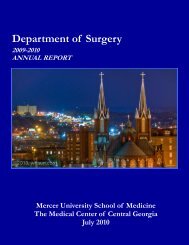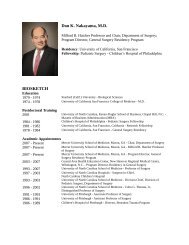Annual Report 09 - MCCG General Surgery Residency
Annual Report 09 - MCCG General Surgery Residency
Annual Report 09 - MCCG General Surgery Residency
Create successful ePaper yourself
Turn your PDF publications into a flip-book with our unique Google optimized e-Paper software.
To provide a high quality clinical surgical services to the central Georgia region<br />
The Department is part of the Health Services of Central Georgia (HSCG), the professional services arm<br />
of <strong>MCCG</strong>. We have primary responsibilities in three clinical areas: Trauma and surgical critical care; surgical<br />
services to the medically indigent; and pediatric surgery.<br />
<strong>MCCG</strong> is a Level 1 Trauma Center, and is certified by the Georgia Division of Public Health and the Office<br />
of Trauma. Dr Ashley serves as Director. The Trauma Center had more than 1,500 admissions, making<br />
it one of the busiest in the state.<br />
Dr Ashley serves as Chair of the Georgia Trauma Care Commission, a group charged with leading trauma<br />
care policies for the state. Last year it distributed $55 million to hospitals, emergency medical systems, and<br />
trauma surgeons using formulas based upon Trauma Center level designation, volume, and acuity of<br />
trauma patients treated. <strong>MCCG</strong> received more than $2.5 million from the state under Commission recommendations.<br />
This year the Commission helped to pass the “Super Speeder Bill” whereby increased fines for<br />
major speeding violations will be devoted to help fund trauma care.<br />
Service to the medically indigent is an important function of the Department. Macram Ayoub, M.D.,<br />
Professor and Vice Chair of the Department, is Director of this part of the surgical practice. CarePartners<br />
is a novel practice management plan for indigent patients that determine patients’ ability to pay, and identify<br />
and enroll patients eligible for such programs as Medicare and Medicaid. Many patients will be eligible<br />
for charity care, the extent to be determined by a financial review. Costs will be controlled by a system of<br />
medical review that is essentially the same to that conducted by commercial insurance carriers.<br />
CarePartners is in its first year of operation. The major effect is a 26% decrease in total patient encounters<br />
for all departments and a 39% decrease in surgical encounters. While this decreases exposure to ‘bad debt’<br />
from non-paying patients, this also has decreased the caseload for the residents. Continued close monitoring<br />
of the effects of the program is necessary.<br />
18
















